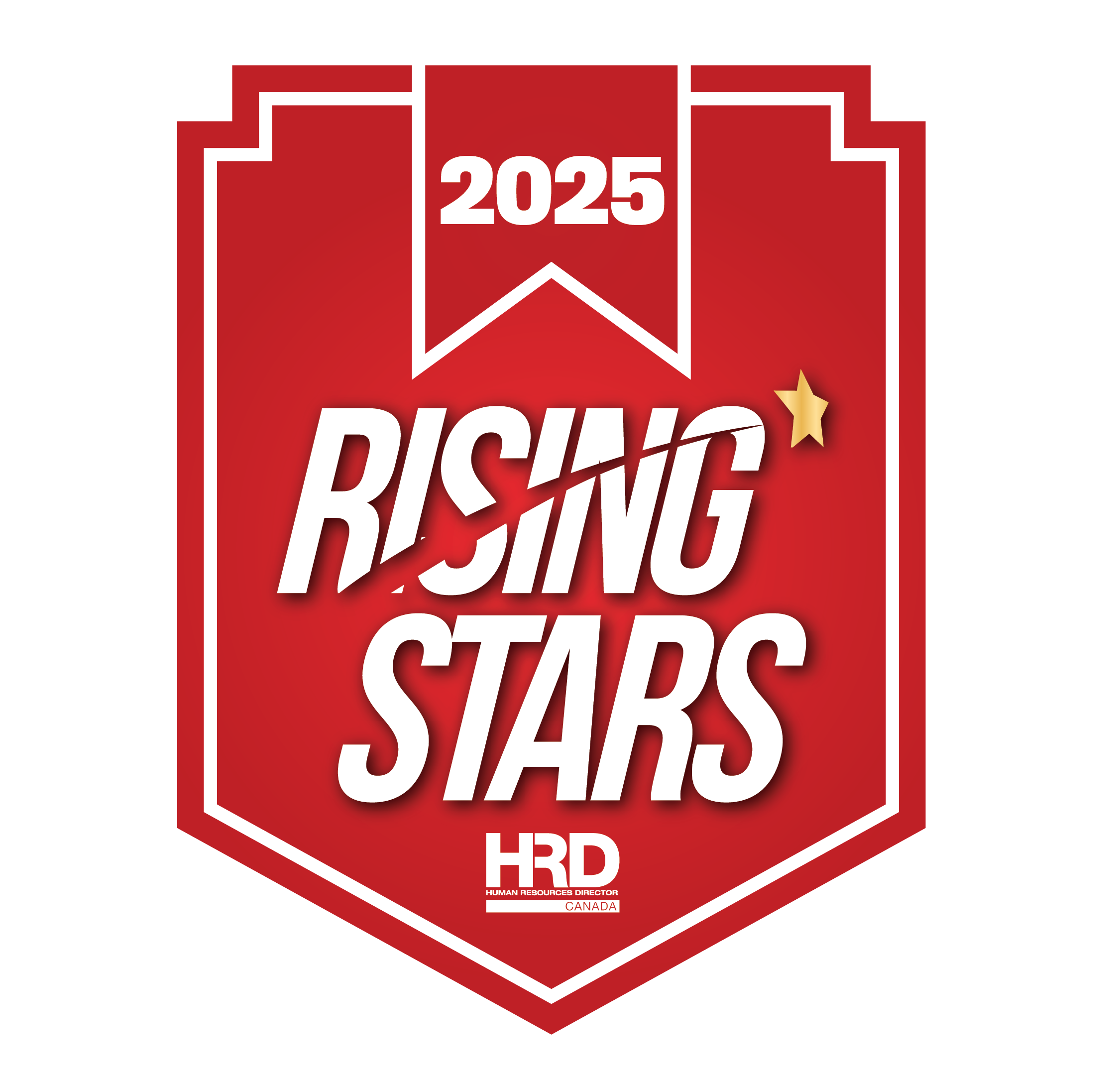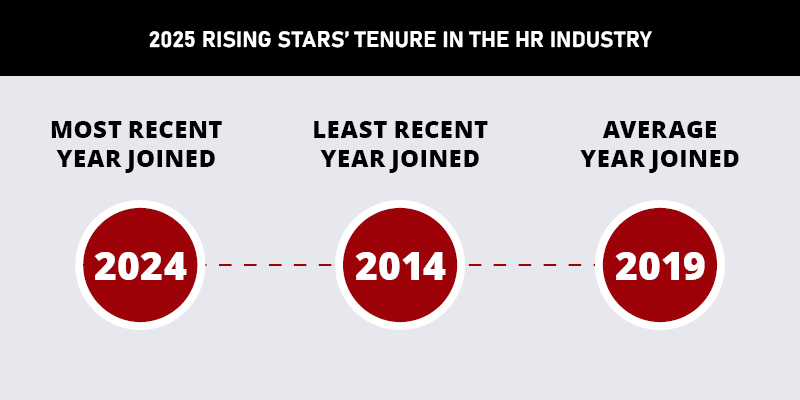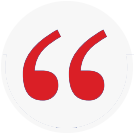

Jump to winners | Jump to methodology
Industry experts agree that more is expected, and the demands are tougher, on the next generation of HR leaders in Canada, than they were even a few years ago. However, the best in the profession have stepped up to the plate and earned their place in the spotlight.
In an industry experiencing rapid technological evolution and shifting workplace paradigms, these top young HR professionals are the driving force of innovation, inclusion, and strategic growth.
Despite facing economic headwinds, hybrid work transitions, and the pressures of digital fluency, they are not only surviving – they’re thriving.
Through a blend of technical skill, emotional intelligence, and a deep sense of purpose, these emerging leaders are carving a bold path forward in the HR landscape. HRD Canada recognizes a prestigious group of 30, for their ability and future potential, as the Rising Stars of 2025.
“A top young professional in 2025 understands people and technology equally well,” says Nupur Gill, managing consultant at Robert Walters Canada. “They’re quick to learn, confident in using data, and always looking for ways to improve how teams work.”
This blend of agility and initiative is what sets Canada’s high-performing young HR professionals apart. They take ownership of challenges, confidently lead initiatives, and communicate with clarity. Their contributions are strategic and, even in the absence of formal leadership titles, they demonstrate influence, cross-functional collaboration, and the ability to catalyze positive organizational change.
Gill notes these professionals are embracing roles that require them to be ambassadors of innovation, leverage data, master digital tools, and drive business strategy to elevate the HR function. As a group, they’re not content with the status quo and collectively seek better ways of doing things – whether it’s streamlining talent acquisition, optimizing employee experience, or improving DEI outcomes.
This ability to be all-rounders is why the top young professionals are in demand. A report by recruiter Robert Half shows that 91 percent of Canadian HR managers are “grappling with the challenge of finding skilled talent, underscoring the competitive nature of the HR job market”.

Today’s rising stars in HR aren’t just contending with traditional career development – they’re building careers in an environment marked by economic uncertainty, hybrid work challenges, and evolving employer expectations.
Gill explains that flatter hierarchies and accelerated change cycles have changed this for young professionals. “There's greater pressure to contribute meaningfully from day one and also show leadership potential, cross-functional collaboration, and strategic insight early in their career,” she says.
The best are meeting this challenge head-on. Whether it’s leveraging HR analytics, integrating AI tools, or leading organizational change initiatives, these professionals are proving their value in high-impact areas that were once the domain of senior leaders.
Ashlee Langlois, CEO of CPHR Saskatchewan, describes top young professionals as those who “demonstrate outstanding potential as future leaders” and are recognized for “passion, innovation, and a commitment to excellence”.
What defines this new generation is a desire for purpose and impact. Langlois notes that young professionals want more than a paycheck – they are seeking alignment with an organization’s mission, vision, and values. When that is missing, engagement and retention suffer.
These Rising Stars are also finding success by seeking out organizations where they can make a difference, both internally and externally. They’re often involved in community initiatives, advocacy work, and mentoring, embodying the ethos of HR as a profession rooted in people, purpose, and progress.
Langlois also observes that many are reshaping HR culture by advocating for healthy work-life balance. “Especially early in their careers, young professionals feel pressure to prove themselves, but that can lead to burnout. A supportive culture that values well-being makes all the difference,” she says.
Technology – especially AI – is reshaping the HR sector, and young professionals are expected to lead the charge. But with automation taking over many technical tasks, success increasingly hinges on mastering the human skills AI cannot replicate.
Critical thinking, empathy, creativity, and relationship-building are becoming the new power skills. According to Langlois, the top performers are those who “learn how to work with technology, not be replaced by it.” They pair digital fluency with emotional intelligence to elevate HR from transactional to transformational.
This also includes self-leadership. With hybrid work reducing in-person supervision, young HR professionals are expected to manage their time, remain self-motivated, and stay aligned with organizational goals independently. The most successful have embraced this autonomy and turned it into an opportunity.
Across the board, both industry experts emphasize the importance of a proactive approach to career development. The young professionals making their mark take ownership of their learning by seeking out mentorship, requesting feedback, and participating in continuous education.
Langlois describes them as “committed to pursuing excellence” and highlights their involvement in professional associations, industry events, and certification programs.
She says, “They bring enthusiasm and passion to the HR profession and may be involved in initiatives outside of the workplace, such as volunteering and community involvement.”
These talented professionals have faced a wave of transformation that has reshaped HR. Here’s what they identify as their most significant recent challenges and how they’re working to overcome them.
One of the most commonly cited challenges has been managing the shifting expectations of employees. The move to hybrid work, combined with rising demands for flexibility, DEI, and mental health support, has created a complex balancing act.
“With shifts in workforce dynamics – hybrid models, talent shortages, and a focus on DEI – HR has become more strategic and adaptable,” says Rising Star Ali Najaf of shipbuilder Seaspan.
He addressed the challenge by launching a Management Fundamentals Program and enhancing onboarding to better support hybrid and cross-cultural teams, ensuring that people feel valued from day one.
The line between personal and professional life has blurred, and the toll is being felt across all levels of the workforce.
“We've had to support teams through inflation, rising costs of living, mental health challenges – while working with limited resources,” says HR manager Breanna Lemieux of Skyline Group of Companies. “The question is: How do we provide support to employees while maintaining professional boundaries and upholding performance standards and achieving our business objectives?”
To meet this challenge, some Rising Stars introduced flexible work policies, expanded benefits like Tax-Free Savings Accounts and fertility support, and more compassionate leave policies, all rooted in ongoing employee feedback.


For some young professionals, working in a family business or government agency has brought additional challenges, particularly when trying to modernize legacy structures.
“It was difficult to navigate the intersection of family dynamics and professional HR practices,” shares Claire Hickman, culture and engagement manager for Hickman Automotive Group, while another described transitioning the HR function within a provincial agency from a transactional to a strategic advisory role. This required not just policy updates, but a shift in mindset across leadership.
For many, one of the most significant pain points was recruiting fast enough to meet business expansion.
“At Patry Group, our biggest challenge has been staffing to match our growth expectations,” says HR generalist Duane Wainman. “We’ve had to utilize all available avenues – from Labour Market Impact Assessments and work permits, to building strong partnerships with universities, colleges, and high schools to develop a talent pipeline.”
Also tapping into co-op programs and apprenticeships offered a more sustainable approach while supporting long-term workforce development.
The HR landscape is being reshaped by rapid technological advancement and global volatility. The Rising Stars have kept up with constant change while remaining grounded in people-first values.
“The constant shifts in technology, workplace culture, and global events have made it crucial to stay adaptable and proactive,” says Felicity Baccin, HR generalist from Beyond Rewards HR. “Staying ahead has required a great deal of flexibility and continuous learning.”
Flexibility, they say, is no longer just a ‘nice to have’ – it’s the foundation of success. Many have adopted agile HR frameworks and are experimenting with new platforms and digital tools to future-proof their teams.
Engagement has taken on new urgency, particularly as remote and hybrid teams became the norm. But creating meaningful engagement – beyond surface-level programs – has proved challenging.
The difficulty has been driving employee engagement within programs and making important process changes to support that. By listening closely and streamlining internal processes, HR leaders have seen stronger adoption of initiatives and improved employee experience across functions.
Some Rising Stars have focused on operational efficiency, aiming to cut through the red tape and reduce friction in daily HR processes. They collaborated cross-departmentally to build a better system – proof that even behind-the-scenes work drives meaningful impact.
“One of the biggest challenges I had faced was streamlining processes to avoid unnecessary steps that were often repetitive,” says FedEx Freight Canada’s Mais Baseet, an HR administrator.
For some, relocating to Canada added a deeper, more personal dimension to the challenge.
“Balancing adaptability with authenticity while staying true to my values and expertise while navigating the nuances of the Canadian work culture as a newcomer” was a challenge to Nina Woock, people + culture business partner at architectural firm Turner Fleischer.
“I’ve had to re-establish myself in an HRBP role within a new industry. This required me to quickly learn industry-specific challenges, build credibility with leadership, and influence organizational change while managing multiple new projects and evolving team dynamics,” she says.
Despite this, the best young HR leaders have succeeded by staying rooted in their values.
Whether its layoffs, restructuring, or employee crises, the emotional burden of difficult conversations remains one of the toughest parts of the role.
“It’s part of the job, but it never gets easier,” says HR generalist Sneha Suresh of Pet Valu. “Delivering difficult news while maintaining respect and dignity for those affected is a burden that lingers long after the conversation ends and the numbness the repetition brings.”
The best young HR professionals have emphasized the importance of empathy, transparency, and professionalism, even in the hardest moments.
Finally, fairness in remote work access has emerged as a surprising flashpoint.
“The biggest challenge has been managing frustration around remote work inequality,” adds Daily Bread Food Bank’s people and culture manager, Sofia Arora. “Especially since some employees felt it was unfair that others were allowed to work remotely while they weren’t. As we operate during holidays, it was tough to balance the need for in-person roles while maintaining transparency and fairness in decision-making.”
Addressing this issue has required clear communication and policy standardization, ensuring that remote work privileges are aligned with role requirements.


The best young talent in the Canadian HR industry are redefining what it means to be impactful, strategic, and values-driven professionals.
There is a series of common criteria and pivotal skillsets that drew more experienced HR professionals to nominate them to be considered as Rising Stars of 2025.
What sets many apart is their strategic mindset and deep business acumen.
Divisional vice president Stacey Psiharis of Hudson's Bay Company was picked out for leading the People Experience across more than 80 retail locations. Her ability to translate business needs into actionable HR strategies – spanning talent acquisition, labour relations, compensation, and DEI – demonstrates the high-level thinking often expected of more senior leaders. She is not only aligned with the stores’ senior team but also serves as the company’s lead on complex labour negotiations, all while guiding a lean team through the challenges of today’s retail landscape.
Another standout was Interfor’s Mackenzie Kerr, who has played a key role in integrating newly acquired operations into Interfor’s HR structure. Her strategic influence in labour relations, talent development, and team building across the New Brunswick region for the forest products company, reflects both operational excellence and leadership maturity. Her proactive development of HR roadmaps, trust-building with union leaders, and strong grasp of legislation and policy are hallmarks of a high-impact business partner.
Several nominees have transformed the employee experience through innovative programs and progressive HR practices.
A prime example is Nick Yee for his work at The University of British Columbia, where he leads employee experience initiatives, such as an integrated onboarding program and the Workplace Experience Survey highlighting his ability to lead institution-wide transformation. The workplace strategy and employee experience specialist’s introduction of AI-enabled analytics and deep engagement with Indigenous and equity-focused learning pathways exemplifies forward-thinking HR leadership.
Similarly, Emily Chute’s contributions to TransAlta Corporation – including the Women in Trades initiative and Generation Gender Diversity Program – have received national recognition. Her ability to champion both employee engagement and inclusion, while also pursuing professional development (like her CHRP designation), demonstrates the kind of dual focus that earns respect from senior HR leaders.
The Rising Stars also stand out for how they shape culture and employee engagement. Colleagues Shannon St-Louis and Kailyn Douglas at discount store chain Giant Tiger have each led the design and implementation of company-wide recognition programs, significantly improving retention and morale.


St-Louis’s strategic work in job evaluation, pay equity, and compensation has enhanced the organization’s competitive positioning, while Douglas has spearheaded key HRIS improvements that streamline HR functionality and empower users across the company.
At Moneris, Jacqueline Campbell led employer branding and talent attraction with measurable results, while managing a $200,000+ marketing budget and delivering award-winning storytelling through the Moneris Mosaic program. These efforts speak to a strong grasp of talent branding, candidate experience, and employee storytelling.
Finally, what consistently sets these nominees apart is their leadership beyond title. From coaching leaders to mentoring team members to community engagement, these professionals lead by example.
Their self-motivation, empathy, and authenticity are driving real cultural and organizational change – and that is exactly why they’ve been nominated by those who see their potential every day.
HRD Canada’s 2025 winners have earned recognition not just for what they do, but for how they do it. As a collective, they reflected on the qualities that have propelled them forward in their careers so far.
Many bring a consultative approach to HR, operating as strategic partners rather than administrative supporters. With a sharp focus on aligning HR with business objectives, they are fluent in organizational strategy, change management, and performance optimization. Their ability to think holistically and advise senior leadership has set them apart early in their careers.
A standout strength among the nominees is their ability to build strong, trusting relationships across all levels of the organization. Whether working with frontline staff, executives, or external partners, these HR professionals listen deeply, communicate clearly, and approach challenges collaboratively. Their trust-based approach fosters open dialogue, psychological safety, and a sense of belonging that enhances workplace culture.
Several highlighted empathy and active listening as core strengths. These qualities allow them to navigate complex interpersonal dynamics, mediate sensitive situations, and make colleagues feel genuinely seen and heard. Their inclusive mindset has helped create environments where authenticity and feedback thrive, ultimately leading to more engaged and productive teams.
Determination emerged as another defining quality. The Rising Stars are driven by a relentless commitment to growth and results, even in the face of adversity. Whether entering new markets, overcoming operational hurdles, or motivating teams through uncertain times, they demonstrate grit and optimism. This resilience not only fuels their own success but also inspires and uplifts those around them.
Finally, a growth mindset underpins their success. They are constantly learning, refining their practices, and seeking ways to better support their organizations. Their dedication to mentoring others, pursuing professional development, and staying current with HR trends underscores a forward-looking and impact-driven approach.
In January 2025, HRD Canada invited HR professionals across the country to nominate their most exceptional young talent for the Rising Stars list.
Nominees had to have HR work experience of 10 years or less, as well as experience in executing progressive HR initiatives, and be committed to a career in human resources, with a clear passion for the industry. Nominees were asked about their current role, key achievements, career goals, and the contributions they had made to shaping the industry. Recommendations from managers and senior industry professionals were also taken into account.
The HRD Canada team reviewed all nominations, narrowing the list down to 30 of the sector’s most outstanding young professionals.